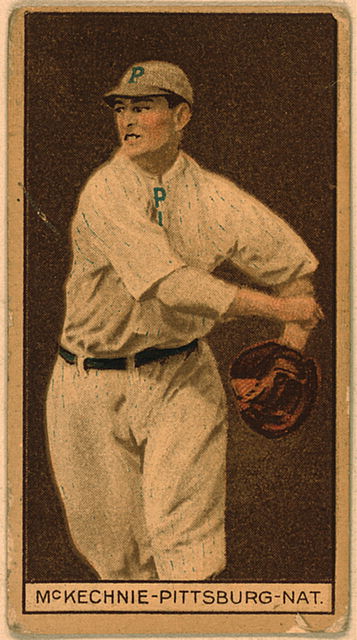- Bill McKechnie
Infobox MLB retired
name=Bill McKechnie
position=Third baseman /Manager
bgcolor1=black
bgcolor2=#c6011f
textcolor1=white
textcolor2=white
bats=Both
throws=Right
birthdate=August 7 1886 Wilkinsburg, Pennsylvania
deathdate=death date and age|1965|10|29|1886|8|7Bradenton, Florida
debutdate=September 8
debutyear=by|1907
debutteam=Pittsburgh Pirates
finaldate=September 20
finalyear=by|1920
finalteam=Pittsburgh Pirates
stat1label=Batting average
stat1value=.251
stat2label=Stolen base s
stat2value=127
stat3label=Runs batted in
stat3value=240
teams=As Player
*Pittsburgh Pirates (1907, 1910-1912, 1918, 1920)
* Boston Braves (1913)
*New York Yankees (1913)
*Indianapolis Hoosiers (1914)
*Newark Pepper (1915)
* New York Giants (1916)
*Cincinnati Reds (1916-1917)As Manager
*Newark Pepper (1915)
*Pittsburgh Pirates (1922-1926)
*St. Louis Cardinals (1928-1929)
* Boston Braves/Bees (1930-1937)
*Cincinnati Reds (1938-1946)
highlights=
*World Series champion: 1917, 1925, 1940
*National League pennant: 1928, 1939
*Federal League pennant: 1914
*Managerial record: 1896-1723
hofdate=by|1962
hofmethod=Veteran's CommitteeWilliam Boyd McKechnie (
August 7 1886 -October 29 1965 ) was an Americanthird baseman , manager and coach inMajor League Baseball . He was the first manager to winWorld Series titles with two different teams (1925Pittsburgh Pirates and 1940Cincinnati Reds ), and remains one of only two managers to win pennants with three teams, also capturing theNational League title in 1928 with theSt. Louis Cardinals . His 1,892 career victories ranked fourth in major league history when he ended his managing career in 1946, and trailed only John McGraw's NL total of 2,669 in league history. He was nicknamed "Deacon" because he sang in his church choir and generally lived a quiet life.Career
Born in
Wilkinsburg, Pennsylvania , McKechnie made his major league debut in by|1907 with thePittsburgh Pirates , appearing in 3 games, before reemerging with the team in by|1910 in a more substantial role. Autility infielder for the first half of his career before playing more substantially at third base later on, McKechnie played with the Pirates (1907, 1910-by|1912, by|1918, by|1920), Boston Braves (by|1913),New York Yankees (1913),Indianapolis Hoosiers (by|1914),Newark Peppers (by|1915), New York Giants (by|1916) andCincinnati Reds (1916 - by|1917). His best offensive season came in 1914 with the Hoosiers, when scored 107 runs, batted .304 and stole 47 bases.McKechnie got his first taste of managerial duties in 1915 when he managed 102 games for the Newark Pepper, leading the team to a 54-45 record. Shortly after retiring as a player in 1920, McKechnie returned to manage full-time, assuming the helm of the Pirates in by|1922. Managing the Pirates (1922 - by|1926),
St. Louis Cardinals (by|1928 - by|1929), Boston Braves (by|1930 - by|1937) and Cincinnati Reds (by|1938 - by|1946), he compiled 1,896 wins and 1,723 losses for a .524 winning percentage. His teams won fourNational League pennants (1925, 1928, 1939 and 1940) and twoWorld Series championships (1925 and 1940), and he remains the only manager to win National League pennants with three different teams (Pittsburgh, St. Louis and Cincinnati).McKechnie did not do as well with Boston as with the other NL teams, but he managed to finish "fourth or fifth with teams that should have been eighth," according to Lee Allen in "The National League Story" (1961). The only year in which the Braves did not even do moderately well during McKechnie's time as manager was in by|1935, when
Babe Ruth was with the team. Ruth's presence made it impossible, Allen says, for the manager to enforce discipline; the faded star drew a huge salary, and lived apart from the team on the road. He lasted only about a month and hit .181. The Braves won 38 games that year and lost 115, finishing dead last.According to one baseball reference work, McKechnie had a poor sense of direction, which did not improve when, as the Reds' manager, he began traveling by plane. He arrived in an airport when the Reds were to play the Pirates at
Forbes Field . He hailed a taxi and asked the driver to take him to the Schenley Hotel. "I never heard of it," said the driver. McKechnie gave him the names of the nearby streets. "Never heard of them either," the cabbie said. "How long have you been driving a cab here? the manager asked. "Twenty-five years and then some," said the driver, "But so help me I never heard of the Schenley Hotel! You must be in the wrong town! Where do you think you are?" "Pittsburgh," McKechnie said. "Pittsburgh, hell! retorted the driver. "You're really lost. This isDetroit !"McKechnie was an unusual kind of manager for his era. A very religious man, he didn't smoke, didn't drink, and didn't use profanity. When he had a problem player who was likely to go out carousing, McKechnie's simple solution was to room with him.
After McKechnie ended his nine-year association with the Reds in 1946, he concluded his career with three seasons as the
righthand man of youngCleveland Indians managerLou Boudreau . The Boudreau-McKechnie Indians won aWorld Series in 1948.McKechnie was inducted into the
Baseball Hall of Fame in by|1962 (elected withEdd Roush ). He died at age 79 inBradenton, Florida , and was inducted posthumously into the Cincinnati Reds Hall of Fame in by|1967.The Pirates
spring training home,McKechnie Field in Bradenton, is named after him.tats
Wikimedia Foundation. 2010.
